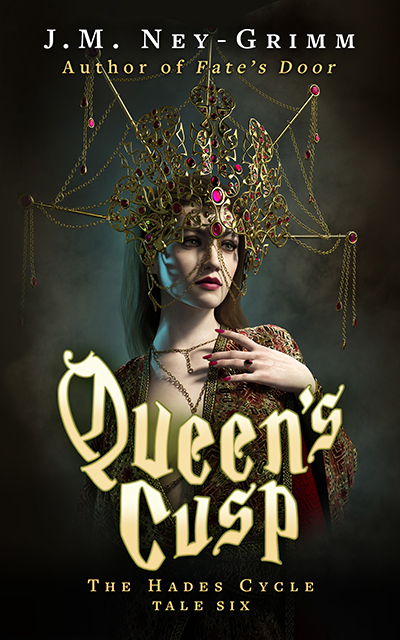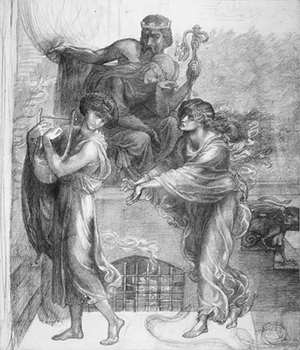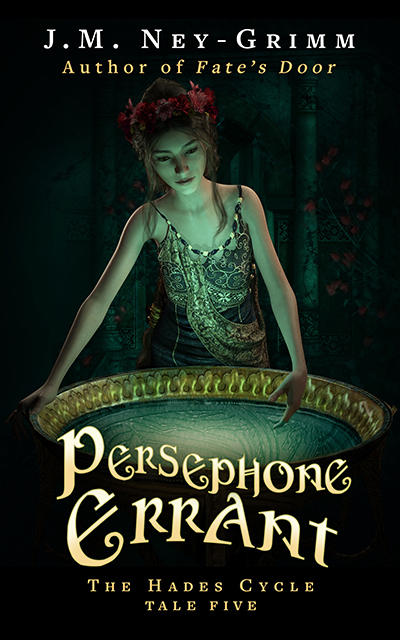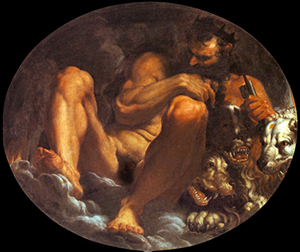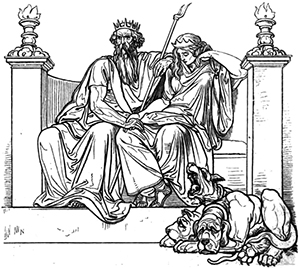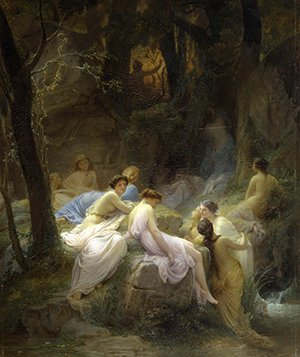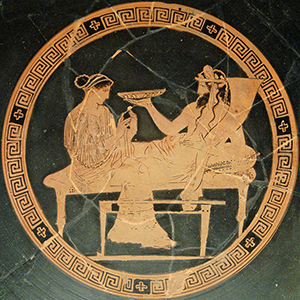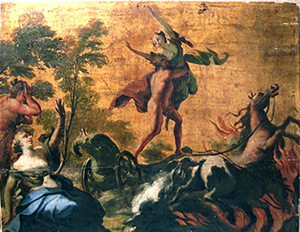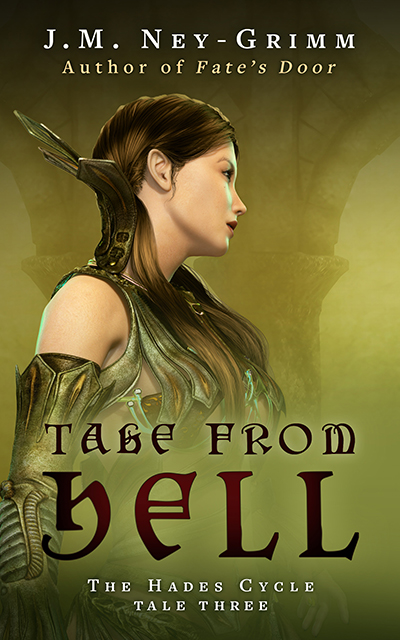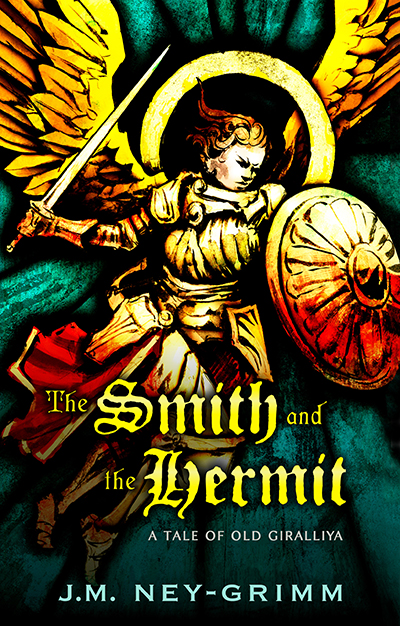
In order to write Theobalt’s redemption in “Illumine Hades,” I had to know a lot more about the mortal man than ever made it onto the story page.
I’ll admit that I’m a Theobalt fan. I like his brashness, his good cheer, and his feckless good intentions. I sympathize with his vulnerabilities. I figure the readers of “Illumine Hades” likely include other Theobalt fans like myself. This post is for you!
I’m going to share my brainstorming process (which I did in my journal), because it presents Theobalt’s history as I learned it. It will have the side effect of drawing back the curtain to reveal some of my writerly methods, so if you prefer not to see the sausage being made… Read no farther! 😀
Here we go!
I need to know more about Theobalt. The heart of his issue is that he felt all through his life that he could never measure up. His response to the sense of inadequacy was that he just wouldn’t try. Why try when failure is inevitable?
I think his mother expected too much of him? Why? Was she a widow? No. Theobalt’s father arranged Theobalt’s marriage. I think Theobalt’s father was a lot like Theobalt himself. He was professionally successful, but relationally unsuccessful. Theobalt’s mother didn’t get what she wanted from Theobalt’s father. When she saw many of the same characteristics in her son, she raged at him.
Theobalt’s father was involved with olive oil. Not wine, because Theobalt is ignorant regarding wine and its qualities. Question: was the family a producer of olive oil or did they ship it? If they were in shipping, they would likely not specialize. So…they both grow olives and buy olives from other, smaller farms. They press the olives and sell the oil to folk in the city and to merchants in more distant cities. Ah! The reason Theobalt’s father was away from home so much was because he would meet with these faraway merchants to make deals. While abroad he would seek new prospects to expand his business.
The more unpleasant Theobalt’s mother became, the more Theobalt’s father would find reason to attend to business. The more neglected Theobalt’s mother felt, the more unpleasant she would grow. Vicious cycle.
That’s the family situation. What about Theobalt himself?
He was a happy-go-lucky lad who loved to run and play with his friends. He hated lessons, hated sitting still, wanted to be on-the-go all the time. If his mother had thought to co-opt him as an errand boy, things would have gone very much better. Instead she insisted on lessons, in-home chores, and keeping her company. It was a disaster.
When Theobalt grew old enough to accompany his father, he did, and his mother was outraged that both her menfolk were gone.
When Theobalt married, he took over managing the olive farm and the dealings with farmers supplying additional olives. His mother grew even angrier, since her husband was away all the time. She blamed Theobalt for enabling this state of affairs.
Theobalt himself didn’t find sea voyages necessary for maintaining sufficient distance from his own wife. He spent days in his office and evenings visiting friends. However, the marriage did not start out on such a bad footing.
I need to understand what Theobalt’s wife brought to the mix. She had been her father’s pet. She expected that kind of attention from Theobalt. She didn’t initially whine and demand such attention. That came later. At first she tried giving more to Theobalt. She cooked delicacies that were his favorites. She dressed up for him. She greeted him at the door when he returned home. She visited him at the office. And Theobalt was appalled. He was accustomed to emotional distance in the home. He started sneaking in and out so that his wife could neither greet him nor bid him farewell. He instructed his secretary to tell her he was out when she arrived at the office. He began to cage invitations from friends to spend evenings at their homes.
What did his wife try next? She asked him what was wrong, and he answered that nothing was wrong.
She tried harder. When that did not work, she tried leaving him alone. But leaving him alone meant they just led parallel lives. Then she started to fuss. And that is when Theobalt started to retaliate.
Okay!
Now I need to lay out the therapeutic process for Theobalt. What would get through to him? He is pretty resistant. Which actually makes him ideal for Dìs, since Theobalt absolutely does not want to recognize the truth about himself, and Dìs needs to learn that confronting the truth is what salvation is all about.
So what is Theobalt’s attitude? That women are just too demanding, it is impossible to please them, and one shouldn’t bother to try.
Dìs will ask: What did your wife want that was so impossible?
Theobalt will start on a long list of trivialities.
Dìs: No, those were what she demanded when you refused her what she really wanted.
Theobalt: What did she really want?
Dìs: Your loving presence and attention.
Theobalt: But I was afraid.
Dìs: Why were you afraid?
Theobalt: My mother had always insisted on more from me and found me supremely lacking.
Dìs: What did your mother want?
Theobalt: Me to sit still, keep her company, and do well at my lessons.
Dìs: That was not what your mother wanted.
Theobalt: What did she want then?
Dìs: Your father’s loving presence and attention.
Theobalt: !! Surely not!
Dìs: Yes.
Theobalt: So when she did not get that, and saw how like I was to him, she hated me.
Dìs: Yes.
Theobalt: But I think she was right to hate me.
That is the process—in outline—of how Theobalt might come to understand how he came to be who he is. But how would he regain—or gain—confidence that he is enough as himself? Because he is afraid of sitting still within being. Be here now. What do you hear? What do you touch. What do you smell? What do you taste? What do you see?
Theobalt will strongly resist that. But the only way to be able to give that kind of attention to someone else is to be able to give it to one’s own experience. And Dìs is in a position to hold Theobalt still enough that Theobalt can discover the ability to be present.
Now I need to think about Dìs’ own experience of all this. How does he start out? Where does he go wrong?
In The Goblin Emperor, Maia’s confusion, headache, and impatience with aggrandizing disputants are presented first. Then his realization that since he cannot please everyone, he need please no one. Next we learn that with the need to please removed, Maia sees clearly. We are shown what he sees and we hear his spoken discussion. Then we witness his assertion of his confident authority, and the scene ends.
That is a really important scene in the story, because Maia is an abused adolescent who is afraid of conflict. He has used placation as a means of survival. We need to see his thought process in his moment of growth.
I suspect my scene with Dìs and Theobalt is equally important in my story. The difference is that we’ve already been shown that Dìs is starting to change his autocratic thought process. Ah! And this is not the scene that is the crux of the matter. And it is not a scene in which he is learning a new skill, even though superficially it might seem that way.
The important thing in this scene is that Dìs discovers that his method of penetrating to the truth for the purpose of judgment can be wielded for a different purpose as well. We need not see him making the mistake of being overly sympathetic. In fact, that should be part of his own realization: Oh! he’d always thought Persephone must lean on sympathy and forgiveness, but—no—she leans on truth.
The mistake Dìs would make is that of moving from to truth to judgment, when he should be moving from his own realization of the truth to Theobalt’s realization of the truth.
Yes, that’s perfect.
I need to figure out where Dìs would start. He’s already been thinking about Theobalt and what he knows of him. He doesn’t need to refresh his memory, because one of the attributes of the gods is that when they want to remember something, they simply do so, accurately. Dìs, when he decides to seek Theobalt, can simply begin where they left off, if he wishes, although he will chose a different beginning.
Where would I start with Theobalt, if I were working with him? I suspect I would have a hard time with him, because I would be too soft. Dìs won’t have that problem. He needs to get him talking, maybe complaining.
What are the complaints Dìs (and we) have heard so far? Away all the time. Bringing unruly friends home. Eyeing the physical charms of other women. Being harsh with their son. Betting on horse races and losing. Dirty habits, uncouth language.
Dìs doesn’t want to hear all this again, and neither do we. What we want is a question that will surprise Theobalt into answering with his deepest fear: she wants me prim and proper and sitting still like a statue on a pedestal.
Dìs: That is not what she really wanted.
Theobalt: It’s what all women want! Even me mana mou wanted that!
Dìs: From you?
Theobalt: Yah, from me! Who else?
Dìs: Indeed. Who else?
Theobalt: Oh. (small voice) Me páppa.
Dìs: And was that her heart’s desire?
Theobalt: She said it was.
Okay, I’m ready to write the scene!
Dìs sipped his wine, reflecting that Theobalt knew nothing of wine, if he called this one merely good. It was superb.
But the wine was merely a means. Dìs must not allow its excellence to distract him. He must win the shade’s confidence—admittedly not hard—and then lead him along a path at which he would naturally balk…
* * *
And there you have it, my brainstorming from start to finish. I often find that writing out my own questions and the answers they inspire clarifies my thinking such that I am ready to begin writing immediately at the close of a brainstorming session.
For more about the lore and process behind The Hades Cycle, see:
Heroines in Hell
Hades’ Many Names
A Hero in Hell
The Reputation of Dís

 I know I had friends. Maybe a band of girls my age? How old am I anyway? Maybe fourteen? Maybe sixteen? I don’t know! But it’s something like that. I think we spent a lot of time out of doors, rambling in the woods, running races, practicing archery? Someone else was the fastest in the foot races, but I was the best with bow and arrow! Oh, I miss the outdoors! I hate this castle and being pent inside from dawn to dusk!
I know I had friends. Maybe a band of girls my age? How old am I anyway? Maybe fourteen? Maybe sixteen? I don’t know! But it’s something like that. I think we spent a lot of time out of doors, rambling in the woods, running races, practicing archery? Someone else was the fastest in the foot races, but I was the best with bow and arrow! Oh, I miss the outdoors! I hate this castle and being pent inside from dawn to dusk!

